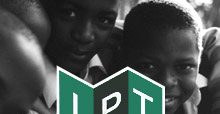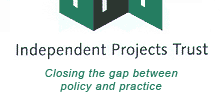
Independent Projects Trust
IPT and the
new changes in education
Curriculum 2005, Outcomes-Based Education, and the South African Schools Act
Propelled by the national department of education and politicians, waves of change are hitting the education system of this country, bringing new challenges and problems. The IPT's stance has generally been one of wary supportiveness. Curriculum 2005 and Outcomes-Based Education (OBE) allows for some exciting changes in teaching particularly with the integration of life skills (including conflict management, environmental awareness, etc.) across the curriculum. With the vision of teaching becoming more facilitative - using cooperative learning techniques and various forms of assessment methods - classrooms could become exciting places of learning. Yet there are many issues to be concerned about.
While much positive reorganisation has occurred since 1994, the list of ongoing problems is well known:
- the majority of KwaZulu-Natal's 5340 schools do not have running water, electricity, windows, books, desks, etc.,
- the massive lack of coordination and leadership amongst the shifting administration levels since the integration of departments in 1995 has created a world-class bureaucracy of red-tape,
- there is no real ethos of professionalism among many educators and administrators,
- large numbers of textbooks are still outdated, irrelevant and inaccurate,
- there is a severe shortage of community-wide appreciation for the importance of education,
- school management is typically hierarchal, inflexible, and top-down with little sense of ownership among parents, teachers, students, etc.
The education system itself has thus been suffering from a malaise of apathy, lack of motivation, and spiralling disillusionment. Into this climate, the national department has now thrust the implementation requirements of their new vision for education. Touted as having been born from a massive democratic participatory consultative process, the vision has received a mixed response of excitement, indifference and resignation from educators, principals, parents, etc., who were by and large mysteriously avoided during the consultation. And the implementation timeline seems to be driven by politicians trying to create voter support for the 1999 elections.
Jonathan Jansen, of the Macro-Education Policy Unit at the University of Durban Westville, recently submitted a paper titled, "Why OBE will fail." A summary of his ten points follows:
- The language and concepts associated with
the new curriculum (particularly with OBE) is too complex, confusing
and often contradictory. The maze of jargon and tortured definitions
are simply inaccessible for most teachers to give these policies meaning
through their classroom practices.
- What official documents claim about the relationship
between curriculum and society, especially OBE's assumed impact on economics,
is unfounded and misleading. It is such an over-sell that is not only
misguides and misinforms teachers and the public, but it also undermines
the authenticity of the policy itself.
- OBE policy is based on flawed assumptions
about what happens inside the average South African classroom. It requires
the development of skills, theoretical understanding and capacity to
transfer the policy across different contexts. Without intervention
at the classroom-level, OBE can only become a mechanical model of behaviourism
in the majority of South African classrooms.
- There are strong philosophical arguments questioning
the desirability of OBE in democratic school systems. OBE policy offers
an instrumentalist view of knowledge which violates the structure of
certain subjects. There is also an inherent contradiction in insisting
that students use knowledge creatively only to inform them that the
desired learning outcomes are already specified.
- There is something fundamentally questionable
about a focus on the ends, when much of the educational and political
struggle of the 1980s valued the processes of learning and teaching
as ends in themselves. This problem extends to the manner in which teachers
as a constituency have been limited in their participation around this
important policy.
- OBE, with its focus on instrumentalism, enables
policy makers to avoid dealing with a central question in the South
African transition viz. what is education for? The learning outcomes
barely allude to values and principles - they are bland, decontextualised,
global statements which will make very little difference in a society
emerging from apartheid and colonialism.
- The management of OBE will multiply the administrative
burdens placed on teachers. Without adequate support such as release
time, aide support, smaller class sizes, etc., OBE will fail. With current
policies of teacher rationalisation and the subsequent increase in average
class sizes, OBE enters an environment which works directly against
its success.
- OBE trivialises curriculum content yet children
do not learn outcomes in a vacuum. It also threatens to fragment knowledge
by ignoring inter-disciplinary demands encountered in learning a complex
task. It further assumes that the way knowledge is acquired is linear.
- For OBE to succeed even in moderate terms,
a number of interdependent education innovations are needed simultaneously:
- trained and retrained teachers
- radically new forms of assessment
- classroom organisation which facilitates monitoring and assessment
- additional time for managing this complex process
- constant monitoring and evaluation of the implementation process
- retrained education managers or principals to secure the implementation as required
- parental support and involvement
- new forms of learning resources (textbooks and other aides) consonant with an OBE orientation
- opportunities for teacher dialogue and exchange as they co-learn the process of implementation
- OBE requires a radical revision of the most potent mechanism in schools militating against curriculum innovation viz., the system of assessment. Without intensive debates about the reorganisation of the assessment system, traditional examinations will reinforce the curriculum status quo.
In his conclusion, Jansen acknowledges that the apartheid curriculum requires radical re-construction. But he warns that the scale of the problem defies simple solutions and asserts that curriculum innovations must take account of the resource status of schools and classrooms as well as the extensive experiences of other countries with similar initiatives. IPT's Initiatives:
Learning Area Committees / Curriculum Development
In our work on various Learning Area Committees (LACs), we strongly suggest committees take an advisory and advocacy role for schools in the region they represent. Rather than being completely aligned with the OBE process, we believe LACs can play a more effective role by aligning themselves with the improvement of education in general. Their functions could then be critiquing proposed policies and documents, acting as information conduits between teachers and provincial bodies, etc. The Port Shepstone Region LAC for Languages & Communication has already taken a lead role in organising themselves around such ideas.
We are also working to build support for the establishment of a Provincial Institute for Lifelong Learning Development (PILLD). This curriculum development body could then coordinate efforts throughout the province including the writing and trialling of learning programmes. Gauteng is already ahead in establishing their GILLD - Gauteng Institute of Lifelong Learning Development, and in recommending to the national department that the implementation schedule be shifted from 1998 initiation to 1999, giving provinces more time to prepare.
The other initiative is to create a materials development unit within IPT to coordinate the writing of teacher and learner materials focused on themes of conflict management, crime prevention, domestic abuse awareness, racism prevention, etc. We look forward to collaborating with other agencies on such materials development!
School Governance - The New Schools Act
In confronting the complex and challenging issues involved in creating and sustaining democratic and effective school management, IPT proposes an original action plan. A Collaborative School Management Network will be established to provide training and continuing support for schools throughout KwaZulu-Natal.
It is widely recognised that "injection-type" training - brief, condensed, once-off modules - will not achieve effective and abiding transformation. Yet a natural tension exists between wanting to meet the demands of affecting real long-term change through in-depth, sustained, small-scale ventures and meeting the huge need for assistance among the province's many schools. This Network attempts to find a median point: a broad-scale, comprehensive programme with appointed area Facilitators providing on-site training, regular follow-up and ongoing support.
School principals and members of school governing bodies will be offered training on:
- understanding the legal and financial implications of the new Act
- team building and democratic leadership
- general administration and human resource functions
- collaborative processes and communication procedures
- setting up fair and open election processes for future use
- participatory representation processes
- and skills in: planning, goal-setting and coordination budgeting and financial management running effective meetings reaching consensus communication problem-solving decision making conflict resolution
Network Facilitators will also assist in school/community meetings to develop the awareness, understanding and capacity of all stakeholders in order to increase ownership and participation. In addition, the programme has two other unique aspects. Firstly, where hostility and controversy exists between school stakeholders, forums will be facilitated to assist in bringing about the reconciliation and trust necessary for collaboration to really work. Secondly, where appropriate, links will be made to the new curriculum development efforts, helping to prepare schools to handle the required enormous changes. Since IPT is already represented on various curriculum implementation bodies, we are well placed to act as information conduits and advocates.
To complete this comprehensive and long-term Network programme, IPT will draw on its extensive range of both human and material resources including our Resource Centre, our Research Department, and the community contacts established through its multitude of past and present trainings and programmes.
"Schools that consciously educate for democracy through providing experience of democratic skills, values and behaviours in the classroom and the school as a whole contribute more to a culture of non-violence than schools that reproduce authoritarianism. A culture of non-violence needs citizens committed to peaceful conflict management through discussion, negotiation, cooperation and compromise based on mutual respect among the differing parties. These are precisely the qualities a democratic education sets out to foster. This paper has reviewed existing international evidence that democratic schools can help to shape democratic individuals and that such schools also tend to be more effective at achieving the conventional goals of schooling such as examination success. There are therefore powerful arguments for greater democracy in schools in the future, though the majority of schools have yet to change and there is still much to be done in education before schools can make a significant contribution to peace."
School Effectiveness and Education for Democracy and Non-Violence - Clive Harber, Dept. Of Education, University of Natal, Durban.


